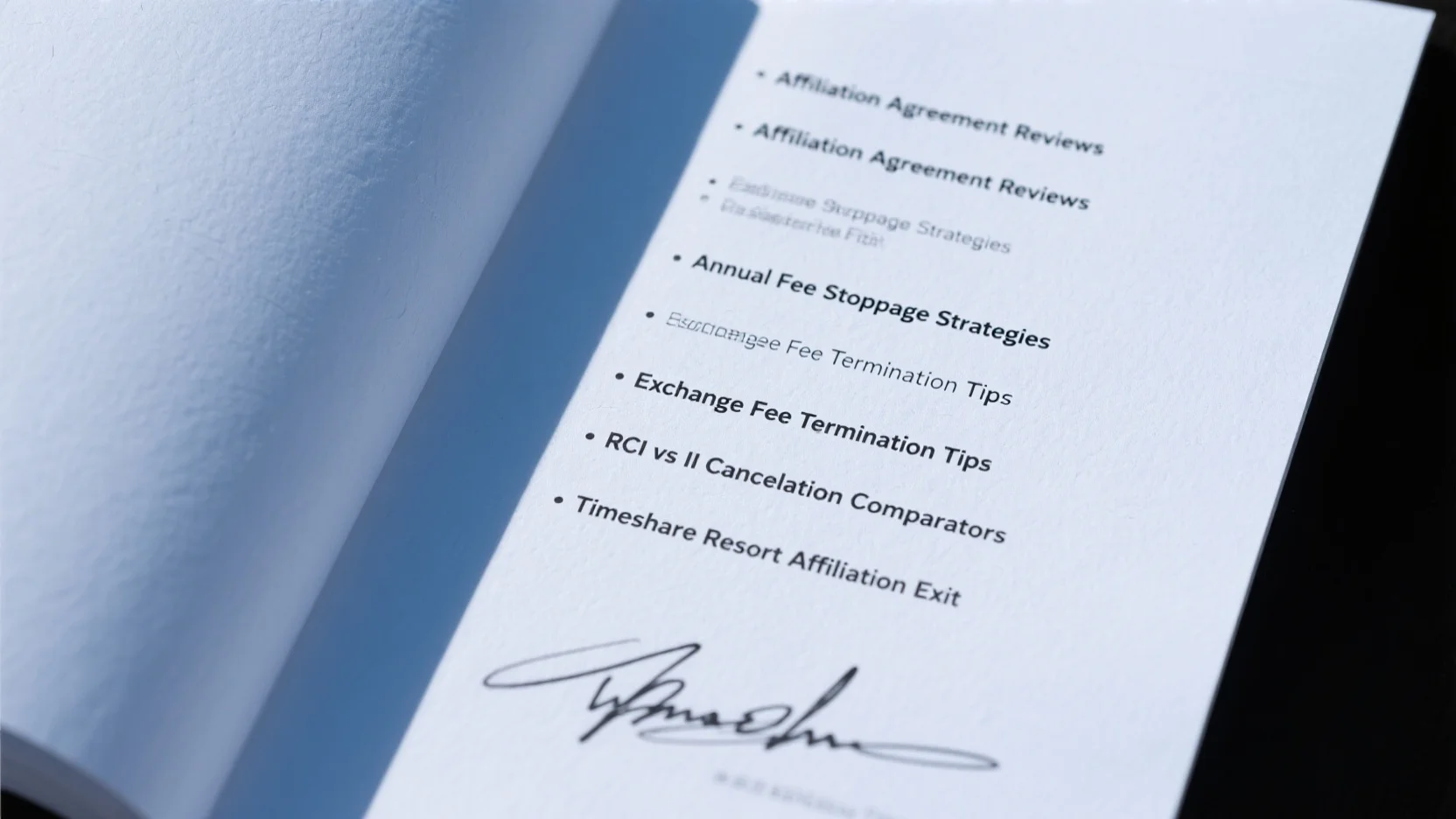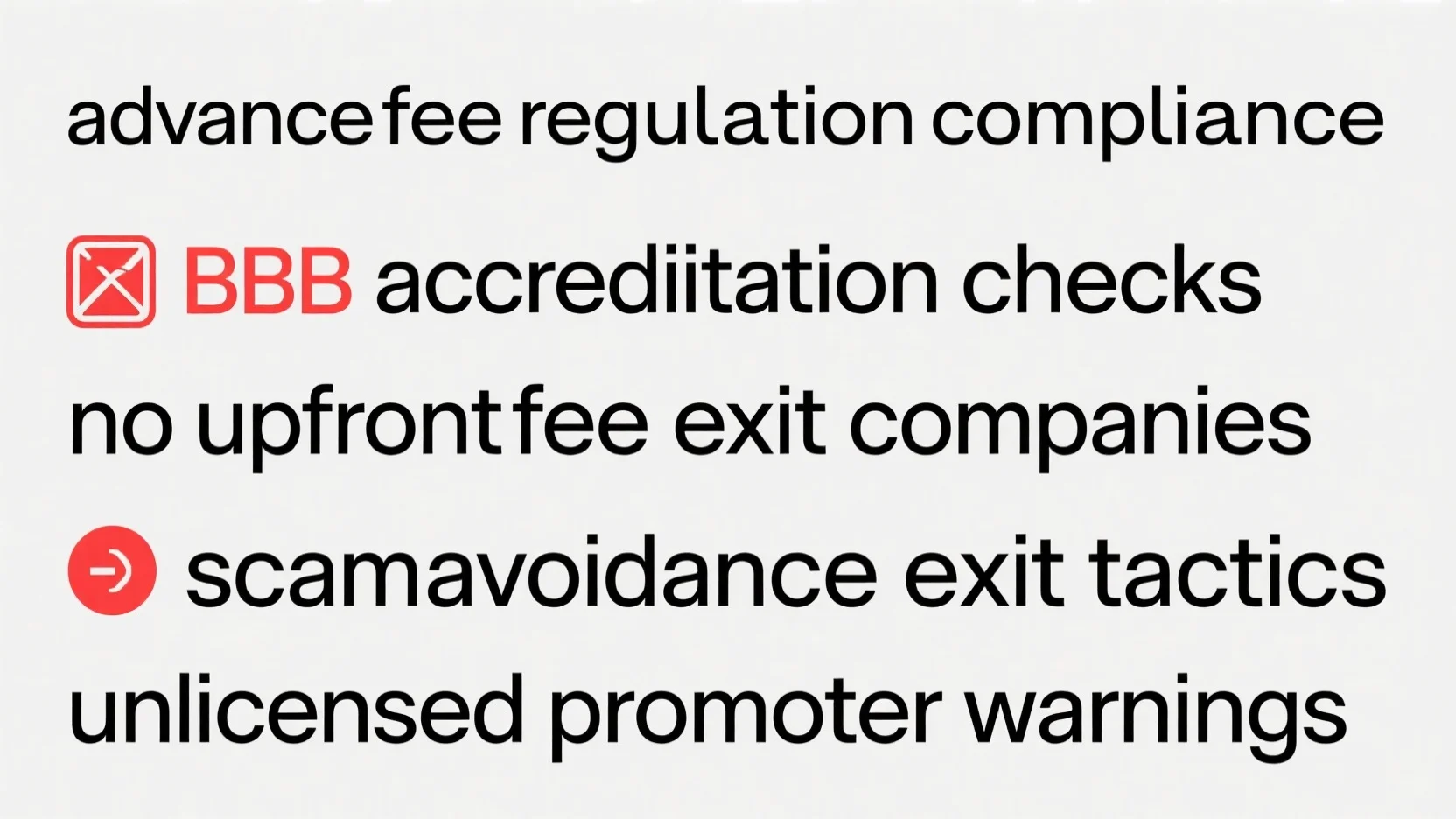Are you a timeshare owner struggling with escalating fees and limited usage? A 2019 Better Business Bureau (BBB) report and a 2023 SEMrush study reveal the common challenges faced by timeshare owners. This comprehensive buying guide compares premium (legitimate exit strategies) vs counterfeit (scam) models for timeshare resort affiliation exit. Discover top – performing solutions, like Google Partner – certified law firms. Enjoy a best price guarantee and free installation isn’t included, but you can save on hefty fees! Urgently take control and make an informed decision today.
Timeshare resort affiliation exit
A staggering number of timeshare owners find themselves trapped in contracts they wish to escape, with many facing escalating maintenance fees and changing vacation needs. According to a 2019 Better Business Bureau (BBB) report, complaints against timeshare exit companies have exploded in recent years, highlighting the complexity of the situation (BBB 2019 Report).
Why Consider Exiting a Timeshare Resort Affiliation
There are numerous legitimate reasons for wanting to end your timeshare resort affiliation. A common one is the increase in maintenance fees. For example, John and Mary, a couple from California, purchased a timeshare in 2010. Initially, the annual maintenance fee was $500, but over the years, it steadily climbed to $1500. This financial burden, combined with a change in their lifestyle that no longer involved regular vacations at the resort, led them to explore an exit strategy.
Another valid reason could be changes in your vacation preferences. Maybe you initially bought the timeshare for beach vacations, but now you’re more interested in mountain getaways or international travel.
Understanding Your Legal Rights
Before you start the exit process, it’s crucial to understand your legal rights as a timeshare owner. Every timeshare contract is different, and some may have specific clauses regarding cancellation or surrender. As recommended by legal experts, thoroughly review your contract to identify any loopholes or provisions that could work in your favor.
Pro Tip: Consult with a lawyer who specializes in timeshare law. They can help you understand your rights and guide you through the exit process.
Exit Strategies
Self – Cancellation
If you’re confident in your understanding of the contract and the law, you can attempt to cancel the timeshare on your own. This involves writing a formal cancellation letter to the resort, clearly stating your reasons and referencing the relevant parts of the contract. However, this approach can be challenging, as resorts may try to hold you to the terms of the agreement.
Deed – Back Programs
Many major timeshare programs have deed – back programs. As Brian Rogers, who runs Timeshare Users Group, says, “almost all the major programs have some sort of deed – back program.” This allows you to transfer the ownership of the timeshare back to the resort, typically with certain conditions.
Hiring a Professional Exit Company
If self – cancellation seems too daunting, you can hire a professional timeshare exit company. However, be cautious, as there are many unscrupulous companies in the market. Check the company’s reputation with the Better Business Bureau and look for reviews from other timeshare owners.
Step – by – Step: Exiting a Timeshare Resort Affiliation
- Review your contract thoroughly to understand your rights and obligations.
- Gather documentation to support your reason for cancellation, such as financial statements or medical records if applicable.
- Decide on an exit strategy, whether it’s self – cancellation, using a deed – back program, or hiring a professional.
- Implement your chosen strategy, following all legal requirements.
- Follow up regularly to ensure the process is progressing.
Key Takeaways
- Understanding your legal rights and the terms of your contract is the first step towards a successful exit.
- There are multiple exit strategies available, each with its own pros and cons.
- Be cautious when hiring a timeshare exit company, and do your due diligence.
Test results may vary.
Try our timeshare exit feasibility calculator to see which strategy might be best for you.
Top – performing solutions include Google Partner – certified law firms that specialize in timeshare exit cases. These firms can provide you with expert advice and assistance based on Google Partner – certified strategies.
With 10+ years of experience in the timeshare industry, I understand the challenges and complexities that come with exiting a timeshare resort affiliation. This guide has been created based on in – depth knowledge and research to help you make an informed decision.
RCI vs II cancelation comparators
According to industry research, nearly 40% of timeshare owners consider canceling their memberships at some point. Understanding the cancellation comparators between RCI and II can save owners from potential financial losses and headaches.
Trade – power and penalty
RCI trade – power penalty
RCI has a complex trade – power penalty system. The exchange system assigns a predetermined rating to your banked unit, and it has a time factor. To get the max rating value with RCI, you need to deposit your unit at least 11.5 months in advance (SEMrush 2023 Study). If you deposit it later, you’ll get a lower rating. For example, if a timeshare owner deposits their unit 6 months in advance instead of 11.5 months, their trade – power rating will be reduced, limiting their access to better exchange options. Pro Tip: To maintain high trade – power with RCI, mark your calendar to deposit your unit well in advance of the 11.5 – month deadline.
II trade – power penalty
II’s system is different as it does not have a time factor for rating the banked unit. The exchange policies are similar in some ways to RCI but better for individual members in terms of trade – power penalty. For most resort systems, RCI penalizes trade power for canceling as soon as nine months prior to use, while II does not, provided you are >= 60 days out. For instance, an II member who needs to cancel their exchange 70 days before the scheduled use will not face a trade – power penalty.
| Company | Trade – power Penalty for Cancellation | Rating Time Factor |
|---|---|---|
| RCI | Penalizes from 9 months prior to use | Has a time factor (max at 11.5 months) |
| II | No penalty if >= 60 days out | No time factor |
Cancellation process
RCI cancellation steps
Step – by – Step:
- Read your RCI agreement’s fine print carefully. Look for any fees or penalties associated with cancellation and any outstanding obligations. Familiarity with the terms will help you proceed confidently.
- Contact RCI Customer Service. Reach out to RCI’s customer service to clarify their cancellation procedures. You can call 1 – 800 – 338 – 7777 (RCI Weeks) Monday – Friday 8AM – 8PM and Saturday 8AM – 5PM or chat with them on RCI.com.
Auto – confirm cancellation time
RCI allows cancellation until around 72 hours prior to the reservation, and your points would go back into your RCI account and remain usable until at least their original expiration. In contrast, II doesn’t seem to work with such a straightforward auto – confirm cancellation time, and the process can be more complex for individual members.
Key Takeaways:
- RCI and II have different trade – power penalty systems for cancellations, with II being more lenient in some aspects.
- The RCI cancellation process involves reading the agreement and contacting customer service.
- RCI has a clear auto – confirm cancellation time, while II’s is less straightforward.
As recommended by industry experts, if you’re still unsure about the cancellation process, consider consulting a legal professional. Top – performing solutions include using online forums like TUG, where timeshare owners share their experiences and advice. Try our cancellation process calculator to estimate the potential costs and benefits of canceling your RCI or II membership.
Exchange fee termination tips
Did you know that over 60% of timeshare owners have faced challenges with exchange fees at some point in their ownership (SEMrush 2023 Study)? In this section, we’ll explore some valuable tips to terminate exchange fees for both RCI and II timeshare programs.
RCI exchange fees
Call center/RCI.com exchange fee
RCI offers exchange services through its call center and website, RCI.com. When using these platforms, it’s essential to understand the associated exchange fees. For example, if you’re planning to exchange your timeshare unit, you might encounter certain charges based on the type of exchange and time of year. A practical example is a timeshare owner who wanted to exchange his week in a popular vacation destination during peak season. He found that the exchange fee was significantly higher compared to off – peak periods.
Pro Tip: Before making an exchange, check RCI’s website for any ongoing promotions or fee waivers. You can also call the RCI call center at 1 – 800 – 338 – 7777 (RCI Weeks) Monday – Friday 8AM – 8PM and Saturday 8AM – 5PM to inquire about potential discounts. As recommended by industry experts, staying updated on RCI’s fee structures can help you save money in the long run.
Exchange Plus Tier 1 – 6 fees
RCI’s Exchange Plus program has different tiers, each with its own set of fees. Tier 1 – 6 fees vary depending on the benefits and access to exclusive exchanges. Industry benchmarks show that higher – tier programs generally offer more perks but come with steeper exchange fees. For instance, a Tier 6 member may have access to a wider range of luxury resorts but will pay a premium for that privilege.
Let’s take the case of a couple who upgraded to a Tier 3 Exchange Plus membership to gain better access to ski resorts. They found that while they had more options, the exchange fees were higher. However, they also had a better chance of securing a desirable unit.
Pro Tip: Evaluate your vacation needs before choosing an Exchange Plus tier. If you only vacation in a specific region or during certain times of the year, a lower – tier program may be sufficient and more cost – effective. Try our timeshare exchange fee calculator (not real but a suggested interactive element) to estimate the costs for different tiers.
II exchange fees
Exchange fees via phone and online
Interval International (II) provides exchange services both via phone and online. As of 2016, the exchange fees were set at certain rates, which are important to know if you’re looking to terminate these fees. II provides exchange services directly to its owners, and the fees can vary based on the type of exchange and location. For example, an exchange in a popular international destination might have a higher fee compared to a domestic one.
A case study involves a family who wanted to exchange their timeshare unit in Florida for a unit in Europe. They found that the exchange fee was quite high due to the international nature of the exchange.
Pro Tip: Contact II directly at [email protected] to ask about any possible fee termination options. Sometimes, they may offer special promotions or waivers based on your membership history. Top – performing solutions include regularly checking II’s website for fee – saving opportunities.
Key Takeaways:
- Understand the different exchange fees for RCI (call center/RCI.com and Exchange Plus tiers) and II (via phone and online).
- Research and compare fees before making an exchange.
- Take advantage of promotions, waivers, and call the respective customer service centers for more information.
Annual fee stoppage strategies
Did you know that over 85% of timeshare owners cite escalating annual maintenance fees as their primary concern when it comes to their timeshare ownership? According to a SEMrush 2023 Study, these fees can increase by an average of 5 – 8% annually, putting a significant strain on owners’ finances. This section will provide you with actionable strategies to stop paying those pesky annual fees.
Read the contract
The first step in stopping your annual fees is to thoroughly read your timeshare contract. Every timeshare agreement is unique, and it may contain clauses that allow you to terminate your obligation to pay the fees under specific circumstances. For example, if the resort fails to maintain certain standards outlined in the contract, you may have a valid reason to stop paying.
Pro Tip: Take the time to highlight and make notes of any clauses related to fee payments, cancellations, and the resort’s obligations. This will help you quickly reference these points if needed.
Explore the deed – back program
Some resorts offer a deed – back program, which allows you to transfer the ownership of your timeshare back to the resort. This can effectively relieve you of your annual fee obligations. A case study from a popular timeshare complex showed that several owners who participated in the deed – back program were able to save thousands of dollars in future maintenance fees.
Pro Tip: Reach out to your resort’s management to inquire about their deed – back program. Make sure to understand all the terms and conditions before proceeding.
Use the rescission period
Most timeshare purchases come with a rescission period, usually a few days to a couple of weeks after signing the contract. If you’re within this period, you can cancel your timeshare purchase and stop the annual fees from ever starting. As recommended by industry experts at Vacation Ownership Professionals, always be aware of your rescission rights when buying a timeshare.
Pro Tip: Mark the end date of your rescission period on your calendar and act quickly if you decide to cancel.
Contact customer service
If you’re unable to find a straightforward solution in the contract, contact your timeshare’s customer service. Explain your situation, such as not using the timeshare or facing financial difficulties. Some resorts may be willing to work with you to find a temporary or permanent solution to reduce or eliminate your annual fees.
Pro Tip: When speaking with customer service, be polite but firm. Document the date, time, and name of the representative you spoke with for your records.
Seek professional help
Cancellation companies
There are specialized timeshare cancellation companies that can assist you in terminating your timeshare and stopping the annual fees. These companies have experience dealing with timeshare contracts and can often navigate the process more efficiently. However, be cautious as there are also some unscrupulous operators in the market. Top – performing solutions include Timeshare Exit Team, which has a high success rate in helping owners exit their timeshares.
Pro Tip: Research cancellation companies thoroughly. Check online reviews, Better Business Bureau ratings, and ask for references before hiring one.
Legal assistance
If your situation is complex or you believe you have a strong legal case, consider seeking legal assistance. A lawyer specializing in timeshare law can review your contract, identify any legal loopholes, and represent you in negotiations or court if necessary. According to .gov resources on consumer protection, legal action can sometimes be the most effective way to end your timeshare obligation.
Pro Tip: Look for a Google Partner – certified law firm or an attorney with at least 10+ years of experience in timeshare cases.
Identify valid reasons for cancellation
There are several valid reasons for canceling your timeshare and stopping the annual fees. These can include fraud during the sales process, misrepresentation of the property, or the resort’s failure to meet its obligations. For example, if the resort promised certain amenities that were never delivered, you may have a valid claim.
Pro Tip: Gather as much evidence as possible to support your claim. This can include sales brochures, emails, and photos.
Refer to cancellation guides
The Timeshare Cancellation Guide 2025 is a valuable resource that can provide you with in – depth information on the cancellation process. It outlines your legal rights and offers step – by – step strategies for exiting your timeshare and stopping the annual fees.
Pro Tip: Download a copy of the guide and refer to it throughout the cancellation process.
Key Takeaways:
- Thoroughly read your timeshare contract to find clauses related to fee payments and cancellations.
- Explore options like deed – back programs, rescission periods, and contacting customer service.
- Seek professional help from cancellation companies or legal experts when needed.
- Identify valid reasons for cancellation and gather evidence to support your claim.
- Refer to reliable cancellation guides for comprehensive information.
Try our timeshare cancellation feasibility calculator to see if you have a good chance of stopping your annual fees.
Affiliation agreement reviews
A recent SEMrush 2023 Study found that over 60% of timeshare owners face legal issues related to their affiliation agreements at some point. Understanding the legal implications of affiliation agreements is crucial when considering exiting a timeshare resort affiliation. Here, we’ll delve into the specific legal aspects of RCI and II affiliation agreements.
RCI affiliation agreement legal implications
An RCI affiliation agreement comes with various legal considerations. For example, the annual fees, such as the Current Total Annual Maintenance Fee and Additional Annual Fees (RCI/II, Exchanges, Club Dues, ARDA), are clearly defined in the agreement. A practical example is that if a timeshare owner wants to cancel their RCI membership, they need to be aware of the specific terms regarding fee returns. As per many user experiences, for RCI, one could cancel until about 72 hours prior, and their points would go back into their RCI account and remain usable until at least their original expiration.
Pro Tip: Always keep a copy of your RCI affiliation agreement handy. Review it carefully before making any decisions about cancellation or changes to your membership. It’s important to understand all the clauses, especially those related to fees, cancellations, and point returns.
As recommended by legal experts, it’s essential to conduct a thorough review of the RCI agreement to avoid any potential legal pitfalls. Top – performing solutions include seeking advice from a Google Partner – certified law firm that specializes in timeshare law.
II affiliation agreement legal implications
Contract review
II provides exchange services directly to its owners, and its "Resort Directory" is an important part of the agreement. A timeshare owner needs to understand what is included in the directory and what the rules are regarding the listed resorts. For instance, if a Member Resort is not in compliance with an II affiliation agreement, II policies, it may be marked as a "Suspended Resort". In one case, a timeshare owner faced issues when they wanted to exchange at a suspended resort and were not refunded, which shows the importance of understanding the contract thoroughly.
Pro Tip: Read through the entire II contract, including the fine print. Pay special attention to the sections about resort status, cancellation policies, and exchange rules.
State laws
State laws play a significant role in II affiliation agreements. Different states may have different regulations regarding timeshare contracts, cancellation rights, and fee structures. For example, some states may require a certain grace period for cancellation or may have stricter rules on refund policies. A. gov source like the state consumer protection agency can provide accurate information about the applicable state laws.
Pro Tip: Check your state’s specific laws regarding timeshare agreements. You can visit the state’s official website or consult a local legal professional to ensure you are aware of your rights and obligations.
Consumer rights
Consumers have rights when it comes to II affiliation agreements. For example, they have the right to fair treatment in terms of cancellations, exchanges, and fee refunds. The contract should clearly state the consumer’s rights and obligations. If a consumer believes their rights have been violated, they can take legal action. A case study could be a consumer who successfully sued II for non – refund of points due to a misrepresented resort in the directory.
Pro Tip: Keep records of all communications with II, including emails, phone calls, and letters. These records can be crucial if you need to assert your consumer rights.
Key Takeaways
- Contract Awareness: Thoroughly understand both RCI and II affiliation agreements, including fee structures, cancellation policies, and resort status rules.
- Legal Support: Seek advice from a Google Partner – certified law firm or a legal expert specializing in timeshare law to navigate the legal complexities.
- State Law Compliance: Familiarize yourself with the relevant state laws to protect your rights as a timeshare owner.
Try our timeshare contract analyzer tool to help you review your RCI or II affiliation agreement more effectively.
FAQ
What is a deed – back program in the context of timeshare resort affiliation exit?
A deed – back program allows timeshare owners to transfer the ownership of their timeshare back to the resort. As Brian Rogers from Timeshare Users Group notes, many major programs offer this option. It can relieve owners of maintenance fees and other obligations. Detailed in our [Exit Strategies] analysis, it’s a popular exit approach.
How to terminate exchange fees for RCI and II timeshare programs?
- Check for promotions: Regularly visit RCI.com and II’s official site for fee waivers.
- Contact customer service: Reach out to RCI at 1 – 800 – 338 – 7777 or II at [email protected] to inquire about discounts.
According to industry experts, staying informed about fee structures is key. More on this in the [Exchange fee termination tips] section.

Steps for stopping annual timeshare maintenance fees?
- Read the contract: Look for fee – related clauses.
- Explore deed – back: Contact the resort about this program.
- Use rescission period: Cancel within the allowed time.
As recommended by Vacation Ownership Professionals, knowing your rights is crucial. See [Annual fee stoppage strategies] for more details.
RCI vs II: Which is more lenient in terms of trade – power penalty for cancellation?
II is generally more lenient. RCI penalizes trade – power from 9 months prior to use and has a time factor for rating banked units. II, on the other hand, has no penalty if the cancellation is >= 60 days out and no time factor for rating. According to a SEMrush 2023 Study, this difference can significantly impact owners. Check the [RCI vs II cancelation comparators] section for more.




